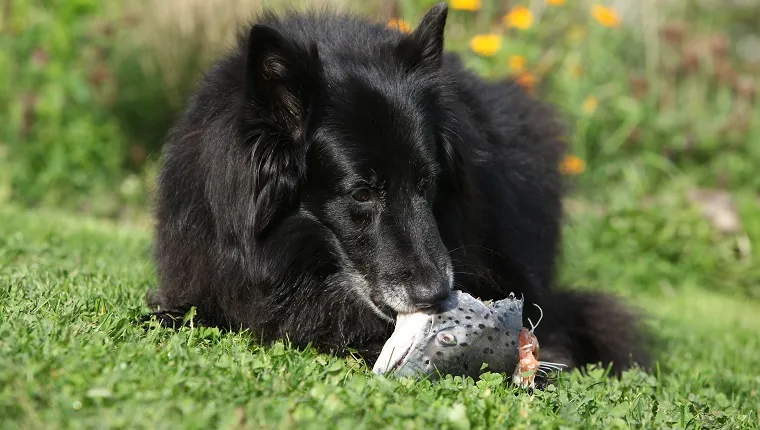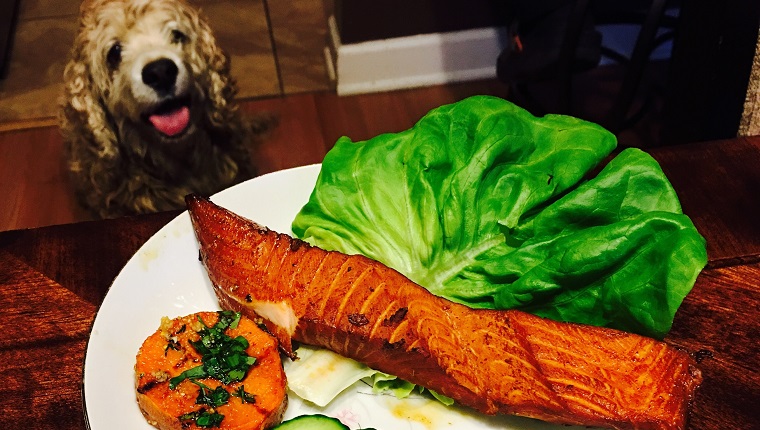Salmon is a delicious and healthy fish option for us humans to eat. But is it good for our beloved dogs to eat, as well?
The quick answer is yes. Dogs can eat salmon, and it’s usually good for them if served properly. In fact, a lot of fish that are good for humans are also safe for dogs to eat. But there are some important facts you should know before simply putting a bowl of salmon down for them to feast on.
Of course, you must also check with your veterinarian before sharing any human foods with your dog, including salmon. Here’s what you should know about feeding salmon to dogs.
What Are The Benefits Of Salmon For Your Dog?
Salmon is a saltwater fish native to ocean waters of Alaska, the Pacific Northwest, and along the Californian coast. It is a ray-finned fish and part of the Salmonidae family. They’re related to the trout, char, grayling, and whitefish.
It’s a popular dish that’s fatty and loaded with nutrients and can help reduce to the risk of several diseases. It’s also a very versatile fish that can be prepared in numerous ways for you and your pooch.
Salmon has many dense nutrients that can be beneficial to your dog’s health. For example, it’s high in eicosatetraenoic acid (EPA) and docosahexaenoic acid (DHA), which are both long-chain omega-3 fatty acids. Here are some of the benefits of EPA and DHA consumption for your pup:
- Regulates the immune system
- Can reduce inflammation that can lead to conditions like arthritis
- Improves your dog’s coat and skin health
- Can help prevent certain skin allergies your dog might have
- Helps with Inflammatory Bowel Disease
- Helps produce more collagen in dog’s system
- Can help brain development in fetuses of pregnant dogs and puppies
- Can fight heart disease and lower blood pressure and triglycerides
- Helps to slow cancer cell growth
- Promotes healthy weight loss in overweight dogs
- Provides support for dogs with kidney disease and issues
- Improves cognitive function in older dogs
- Helps reduce joint issues in older dogs
Along with EPA and DHA omega-3 fatty acids, salmon also contains vitamins A, D, and B, as well as healthy minerals like zinc, potassium, and magnesium.
What Are The Risks Of Salmon For Your Dog?

As with all foods for your dog, everything should be in moderation. And you should always ask your vet before changing your dog’s diet. But the most important thing to focus on when feeding your dog salmon is how it’s prepared.
DO NOT feed your dog raw or undercooked salmon. Raw salmon can contain parasites and bacteria, specifically a parasite called Neorickettsia helminthoeca. This parasite can cause salmon poisoning to your dog and can be fatal.
Some of the signs of salmon poisoning in dogs are:
- Fever
- Vomiting and diarrhea
- Decrease in appetite
- Weakness and lethargy
- Depression
- Extreme weight loss
- Dehydration
- Swelling of lymph nodes
- Discharge from eyes and nose
Diseases and symptoms can vary, so if you notice any of these signs in your dog, make sure to take them to their vet immediately. The sooner you get your dog proper treatment, the higher their chances of survival will be.
In addition to raw or undercooked salmon, there are many brittle and small bones inside this fish. Make sure the salmon you feed your pup is boneless to prevent any choking hazards or damage to their digestive systems.
Also, a proper serving of salmon for your dog should not exceed more than 100 grams per ten pounds of their body weight. If you would like to make salmon a regular part of their diet, feeding them a portion a week should be good enough to maximize all of its health benefits.
If you want to take the guesswork out of what foods your dog can eat, you should try ordering fresh, custom meals for your dog delivered to your door from NomNomNow! Click here to get 20% off your first order!
Do you ever feed salmon to your dog at home? Do they like it? Let us know in the comments below!









